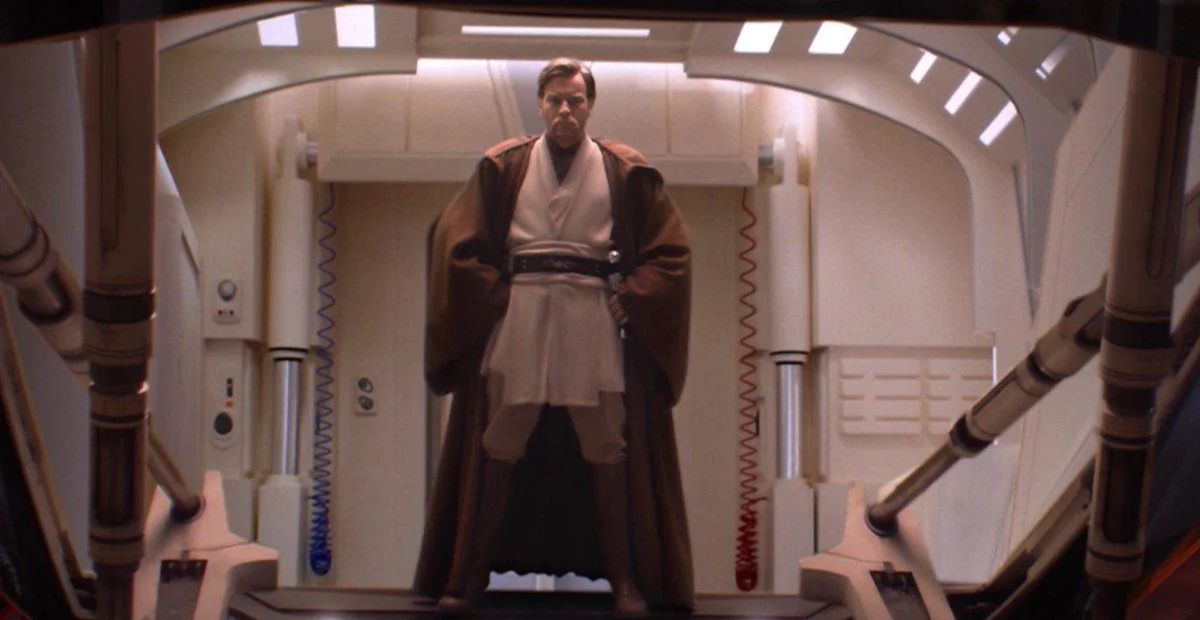Revenge of the Sith gave us countless iconic moments, from Palpatine’s reveal as Darth Sidious to the intense duels between Yoda and Palpatine and Anakin and Obi-Wan on Mustafar.
However, one scene that often raises eyebrows is when Obi-Wan stands on the ship, with a menace stand as Padmé pleads with Anakin.
As Padmé desperately pleads with Anakin, Obi-Wan stands resolute, his presence creating an undeniable tension in the scene.
This stance has led many fans to wonder if it was a deliberate signal of his unyielding commitment to the Jedi cause, reminding Anakin and Palpatine that the Jedi are far from defeated.
So, let’s find out why he stood like that.
The Scene: Obi-Wan’s Entrance on Mustafar
In the scene, Padmé confronts Anakin after he has fully turned to the dark side and taken the name Darth Vader.
While she’s desperately trying to bring him back to the light, Obi-Wan Kenobi emerges from the ship, adding tension to the already heated moment.
He stands tall, and the atmosphere becomes charged.
This is the moment that tips Anakin over the edge, and soon after, Obi-Wan and Anakin engage in their fateful duel.
Obi-Wan first option is to fight with Anakin and looking why Anakin accept to join the dark side of the Force.
However, Padmé understands that if Obi-Wan and Anakin fight, it will likely lead to disaster, as the battle could result in only one of them surviving.
She pleads with Obi-Wan to let her speak to Anakin first, believing that she is the only one who can bring him back from the dark side. Obi-Wan’s stance at this moment seems to convey a silent message: “I’ll give you a chance, but if this doesn’t work, I’ll have to act.”
To be fair, any Jedi in Obi-Wan’s position would likely have done the same. After watching the recording from the Jedi Temple, Obi-Wan fully understood Anakin’s actions, and what he did was unforgivable.
The Symbolism of Obi-Wan’s Stance
Some fans argue that Obi-Wan’s posture is more than just a display of authority and control—it’s a representation of the Jedi’s perseverance in the face of destruction.
As he steps out of Padmé’s ship, Obi-Wan remains calm and composed, projecting the values of the Jedi Order, even when it’s on the verge of collapse.
His stance also signals his readiness for the emotional storm ahead, knowing he must confront Anakin not just as a friend, but as an adversary.
By standing tall and steady, Obi-Wan is subtly asserting his identity as a Jedi Master, showing Anakin that the principles he once held dear are still intact.
It’s not only about preparing for a duel but also about setting a moral example for Anakin, a reminder that there is still a path back to the light.
His body language, firm and deliberate, is almost a final plea, a silent call for Anakin to see reason, before the inevitable battle between them begins.
Obi-Wan’s Sense of Duty Over Personal Loyalty
When we look at Obi-Wan’s decision to confront Anakin, it’s clear he was caught between personal loyalty and duty.
Even after Obi-Wan reveals Anakin’s horrific actions, including the slaughter of younglings, Padmé still chooses love over reason. She begs Anakin to run away with her, ignoring the destruction he has caused. We can see she isn’t thinking about the consequences—only about saving the man she loves.
But Obi-Wan doesn’t have that choice. As a Jedi, duty comes first. The moment Padmé suggests escaping with Anakin, he realizes she can’t be trusted to do what’s right for the galaxy. From that point on, his personal connection to her is broken.
And when we see him face Anakin, he isn’t the mentor or the friend anymore. He is a Jedi standing against a Sith Lord, prepared to do what he must. His stance, his words, and the way he holds back emotion tell us everything—he isn’t acting out of hatred, but out of responsibility.
We know that simply attacking Anakin wouldn’t have been enough. Obi-Wan understands that this is bigger than just their duel—the fate of the galaxy is at stake. He moves forward not with anger, but with the certainty that he has no other choice.
This moment defines who Obi-Wan truly is. He doesn’t let personal attachments cloud his judgment. He makes the hardest decision of all—choosing duty over the people he once cared for most.

